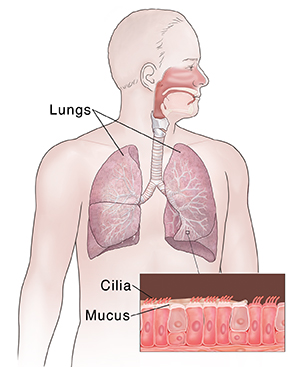Why You Need Respiratory Protection
Your respiratory system allows your body to get the air it needs. Without clean, safe air, your body can't function. Your respiratory system helps protect you from many airborne hazards. But hazards can overwhelm your body's natural defenses. If you don't use a respirator, these hazards can damage your respiratory system. You may feel the effects right away. But some serious health problems may build slowly over time.
Built-in protection
-
Your nose warms or cools incoming air, making it less irritating. Nose hair traps larger particles as you inhale. Your nose also adds moisture to the air, helping it flow more easily through the airway.
-
Cilia are tiny hairs that line the respiratory tract. They move small particles out of the airway. You get rid of these particles by coughing or swallowing.
-
The mucous blanket is a lining along the whole airway. It traps particles and allows for the cilia to move them to the back of your throat. The particles then leave your body when you cough or swallow.
-
The cough reflex is set off as unwanted substances get closer to your lungs.

How hazards can affect you
-
Your nose, mouth, and throat. Dust, fumes, mist, smoke, fog, and other particles can harm your upper respiratory tract (nose, mouth, and throat). Symptoms you may notice are coughing, hoarseness, burning, and congestion. If you're exposed to the hazards over time, you may develop long-term problems throughout the upper respiratory tract.
-
Your lungs. Some particles in the air are too fine to be filtered out by your body's natural defenses. They may become lodged in the tissue. This can cause health problems, such as bronchitis, emphysema, asthma, or even cancer.
-
Your whole body. Some gases, vapors, fumes, and other hazards can easily get past your body's natural defenses. Once they reach your lungs, they can be absorbed into your bloodstream. From there, they can travel to other parts of your body. Your brain, heart, and reproductive organs can be harmed by these hazards. Lack of oxygen also causes serious problems throughout your body. It can quickly damage your heart and brain. It may even cause death.
© 2000-2024 The StayWell Company, LLC. All rights reserved. This information is not intended as a substitute for professional medical care. Always follow your healthcare professional's instructions.